published: 8 /
12 /
2021
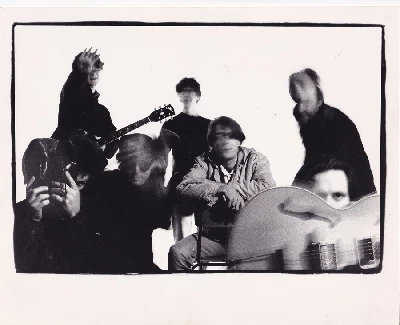
Thirty years ago this month, The Blue Aeroplanes released ‘Beatsongs’, the Bristolian art-rockers' biggest critical and commercial success. But, as frontman Gerard Langley told Nat Mumford, only a twist of fate stopped it from being much bigger...
Article
'I had to buy my own copy...' Blue Aeroplanes frontman Gerard Langley recalls wryly, on-or-about the 30th anniversary of the release of his band's critical and commercial high water mark 'Beatsongs'. He's actually talking about their cover of Paul Simon's 'The Boy in the Bubble', the second single from the album, which was positioned to be their US breakthrough by a hungry label that had spotted an REM-shaped space in the alternative/college radio market and was prepared to back Bristol's finest to fill it....
The Aeroplanes spent a frenetic, all-consuming year writing, recording and promoting what was conceived as their international crossover. Langley consequently spent just a handful of days in his hometown in 1991 and, short of time on one flash visit, was forced to shell out in Replay Records to get hold of a copy of his own record!
The legendary Ocean Way Recording studio on Sunset Boulevard was booked; the finest guest musicians were flown in; US college radio was humming with the sounds of the Blue Aeroplanes and promotional budgets were being cranked to their maximum. Then, in one of those all too familiar rock n roll twists, record company politics intervened.....
….....
Let’s orientate ourselves first. The Blue Aeroplanes rose from the ashes of The Art Objects, who were active in Bristol 1978-81 and whose line-up also included the Langley brothers – Gerard and John - and dancer Wojtek Dmochowski. Debut album ‘Bop Art’ (1984) was a spiky, somewhat self-consciously arty melange; perhaps less a band than a collection of projects in search of an identity. However, it refined the blueprint established earlier by the Art Objects: of Langley’s sung-spoken, often poetic, usually cryptic lyrics sitting within – rather than over the top of – an essentially post-punk vehicle, albeit one often coloured by folk, avant-garde and occasionally even krautrock or jazz elements.
A more substantive line-up then coalesced around the Langleys and Dmochowski and with Fire Records’ promotional muscle behind them, plaudits began to roll in from the music weeklies. This iteration of the band – part Velvets, part Fairport, part Television - featured not only Dmochowski’s dancing but live scratching from turntable wizard John Stapleton, while recordings were augmented with hurdy-gurdy, clarinet and autoharp on two well-received albums.
Langley has remarked of this period that ‘...we never played more than three gigs in a row because everyone was a student and had a tutorial on Wednesday, had to sign on or had just left in a huff’. The ‘inspired amateurism’ of this era yielded some equally inspired music (look up 87’s ‘Spitting out Miracles’ or the 1988 compendium ‘Friendloverplane’), garnered critical acclaim; and sold enough records to land a major deal with the Ensign label - precisely as half the membership downed tools to get ‘proper jobs’. Signing to a major label thus entailed a personnel reshuffle - but also brought a palpable sense of purpose that arguably had been missing from earlier incarnations. The Aeroplanes were now a serious commercial, as well as critical proposition.
New guitarists in particular stood out. Angelo Bruschini, dazzling exponent of modal lead lines, returned to the fold after an absence of a few years – Bruschini reputedly said he’d ‘never understood’ the band the first time around – and would prove quintessential. Two highly focused youngsters were to prove almost as influential: Rodney Allen and Alex Lee.
The result, 1990’s ‘Swagger’, produced by Gil Norton, rocketed the band onto the front pages of the music weeklies as well as into highly respectable chart positions (Langley recalls that ‘Swagger’ sold c.80,000 copies, comfortably more than the c.30,000 sold by Nirvana’s ‘Bleach’ and comparable to the c.90,000 that Sonic Youth shifted of ‘Goo’). A supporting slot on REM’s ‘Green’ tour passed into industry myth for the number of guitarists invited on stage for the traditional encore of Tom Verlaine’s ‘Breaking in my Heart’, including, for the final shows of the tour, all of REM plus their road crew. Michael Stipe returned the favour by providing backing vocals for ‘What It Is’ on 'Swagger'.
All of which brings us up to date and 1991, where in the US, Ensign’s parent company Chrysalis had now become very interested. At home, the Aeroplanes were part of an enviable Ensign stable comprising Sinead O’Connor, World Party and the Waterboys. Stateside, however, Chrysalis couldn’t boast the same critical kudos and were searching for a band in which to locate its creds. In the Blue Aeroplanes, they thought they might have found it.
Langley: “Chrysalis reckoned we had a good chance of becoming the next major crossover alternative guitar band in that REM mould, and created what was to be a two-and-a-half-year campaign, building us up with press and touring – and it was working. We were selling out places like two nights at the Roxy in LA just on the back of college radio, and we were starting to get played on the major commercial alternative radio stations on rotation too. Angelo and I went over there about six weeks ahead of the release of 'Beatsongs' and did loads of promo work, and 'Yr Own World 'was getting blanket radio play.”
First, however, they’d had to find a new drummer. Sibling John’s belligerent style had anchored the band from its inception, but the pressures of touring led to him leaving the fold, with demos in the bag but immediately prior to the 'Beatsongs' studio sessions.
A solution was close at hand. The Aeroplanes had just finished a long tour with compadres The Jazz Butcher Conspiracy, whose drummer Paul Mulreany had, serendipitously, remained in LA. GL: “Paul had watched our set pretty much every night; his girlfriend was from LA; and he’d been hanging out with Rod and Alex too anyway. So we asked him to sit in for a week while we tried out the new producer. He played really well; and we just carried on from there, basically.’"
Mulreany didn’t play on every track, though. GL: “[Producer] Larry Hirsch got it into his head that on some tracks he wanted a heavier-hitting drummer, so he got in Jerry Marotta, one of the top session drummers in LA at the time. He came in for a day and played on four or five tracks, including ‘Aeroplane Blues’. The rest of us were banished to Ocean Way’s lounge area while Larry and Marotta did their thing and while we were waiting out there, Rod Stewart’s ‘D’ya Think I’m Sexy?’ came on over the internal stereo, featuring drums by … Jerry Marotta! He’d played on a lot of stuff.”
Distinguished Peruvian/American percussionist Alex Acuna also contributed to ‘The Boy in the Bubble’, while Langley recalls that (apparently lost) alternate takes even featured the backing singers from Was (Not Was) - surely the Grail of Aeroplanes rareties.
Hirsch was a pointed choice to helm 'Beatsongs'. Working with Norton had been fruitful, but he was now busy with Pixies again. GL: “We weren’t given much choice! Basically [although the label was flagged as Ensign in the UK] we were handed over to Chrysalis in America, who had the likes of Billy Idol and Pat Benatar but were looking for a credible, college radio-compatible, crossover guitar band along the lines of REM.
“So Kate Hyman, the head of A&R at Chrysalis in the States, auditioned producers. Most of them apparently turned out to be a little bit too... serious. There was a lot of chin-stroking going on, I suspect based on preconceptions driven by our earlier UK press. Larry, by contrast, came in with his shades around his neck, sat down and put them on to listen to ‘Jacket Hangs’, the opening track on 'Swagger'. As soon he heard the first line - ‘Pick a card, any card... wrong!’ - he whipped the shades off again and beamed ‘Heeyyy... showbiz!!’”
Hyman hired Hirsch on the spot. He had a distinguished record as a studio engineer, but had recently earned a co-production credit, with T-Bone Burnett and Elvis Costello, for the latter’s ‘King of America’, and subsequently cemented this standing by helming Los Lobos’s ‘Le Pistola et Corazon’ which won a Grammy.
GL: “Larry was an old-school engineer and while he didn’t have a lot of experience as a producer yet, the whole point about Ocean Way was that it had lots of analogue gear and a huge live room; we always preferred to record live, which was a problem for a lot of studios at that time but suited Larry, and so that suited us.”
Both the band and their champions at Chrysalis were keen to edge away from those earlier arty pretensions: “At the time, over here, people used to mostly focus on the poetry stuff and Wojtek’s dancing. In America, we had quite a different image – we were seen as much more rock ‘n’ roll.’ Langley gleefully recalls that The Blue Aeroplanes managed to get themselves barred from the Rainbow Lounge (Lemmy's preferred hangout on Sunset Boulevard) – but, bacchanalian antics notwithstanding, there’s no doubt that 'Beatsongs' is a much ‘straighter’ record on one hand than those earlier efforts, whilst on the other hand sticking to some long-established principles.
GL: “When we started I hooked up with Nick Jacobs and [The Oysterband’s] Ian Kearey and so you had folk rock, you had 60s influences, you had art school stuff, and there was this sense that we could do anything we wanted to do. And we carried that on. So there was a lot of the art school view about the [subsequent] albums; there was a lot of folky shit, a lot of jangly stuff; and you have to remember that in the mid-80s, no-one liked the 60s jangly stuff very much and they fucking hated anything folky!
“So we’d become fairly determined to put this stuff over. A bit of Velvets, a bit of Fairport, but a bit more raggedy... a bit of Faces, stuff like that. And also the post-punk element, of course – live, we were a lot more punky than people expected. Which turned out of course to be the same sorts of influences that REM were working from, co-incidentally, at the same time. That vision didn’t really change when we signed to a major label; we still wanted to put that same stuff across, but we were now trying to do it with new people who were really just focused on making music.”
‘Beatsongs’ is often described as the Aeroplanes’ most ‘American’ record. The band had spent a year on the road, much of which was in the US. Long is the list of British touring bands to have fallen into the trap of writing a ‘difficult’ follow-up album by attempting to assimilate the vastness and complexity of America as seen darkly (and usually hungover) through a series of tour bus windows. ‘Beatsongs’, however, deals with this consummately. Packed with memorable hooks and bons mots, it positively cherishes its American experience. Take ‘Colour Me’, one of the highlights not just of this album but arguably of the band’s whole catalogue.
The Blue Aeroplanes have never been knowingly understaffed when it comes to guitarists. The opening bars of ‘Colour Me’, however, may be the single best illustration of the mutual interdependence of three first-rate guitarists that characterises much of their best work. Instinctively, as heard, it’s a simple enough riff. Listen again and you’ll hear that all three occupy their own space and each is equally essential to the result.
Langley then, as he often does in his most essential moments, invites us in, individually: ‘Let me tell you, tell me something....’ and proceeds, somehow, to offer each of us ‘America’. Or at least, a version of the world that has no precedent in the work of the Blue Aeroplanes before this.
First he shamelessly, knowingly, invokes ‘Piaf, Marlowe... Dylan Thomas’ as equivalent ‘beats’ - surely a subtle play on that most 20th century of capitalist motifs ‘New York – Paris – London' - whilst simultaneously throwing in a casual diss of Tom Waits. It may not be quite on the level of Malkmus vs Smashing Pumpkins as early 90s rock n roll vendetta-fuel, but maybe the difference here is that we aren’t given time to dwell on it. Unlike Pavement, the Aeroplanes aren’t snidely winding up a tune but are just driving off, painting a sound-scene-scape that for once isn’t airborne but is no less for being classically automotive. ‘Colour Me’ is full, not just of colour but of North American space - literal and metaphorical - with Elvis singing of returning to sender; with ‘one for the road’; and distances as oceans. Of course, Langley being Langley, there’s a blurry romance too; and are we meant to infer that he, too, has made a mess of his life like those other ‘beats’? Album opener ‘Huh’, too, with its invitation to ‘throw the book in the air.... see where it lands’, invites us to speculate as to whether an element of self-doubt is creeping in. Yet what we’re hearing is quite the opposite. 'Beatsongs' is the absolute zenith of The Blue Aeroplanes’ confidence and mastery of their craft.
'Yr Own World', the album’s lead single, also captures this dynamic perfectly. If Langley did indeed spend his 1991 in the back of a sweaty tour bus grinding through Nowheresville, OH, you’d hardly guess it on the evidence of this joyous romp. It sounds much more like he spent it cruising through the Hollywood hills in a Mustang, or down Route 66 in a Cadillac. Whereas Langley’s lyrics often, aptly, adopt an aerial perspective, 'Yr Own World' has its pedal to the metal on the American highway, and it’s gasoline that fills our nostrils, rather than jet fuel. ‘I’ll give you my money, just give me a car and tell me where you want to go...’ he offers, and it’s an attractive offer. ‘Now we are young and we'll go far/We'll name our children after our car/Have swivel-hipster-fuel-air-blast/ And crystal-toting plaster casters....Drive me to down to each west coast/if you can read this.. You’re too close’. Even when the singer does ‘catch a plane’, the listener is left with a lingering suspicion that it’s probably an internal flight across the States. It’s a far cry from the provincial, sometimes murky literary stylings of the Fire period, for all their undeniable charm.
But it almost didn’t make it onto the album at all...
GL: “Larry and I fell out over 'Yr Own World'. I’d pegged it as the potential single, but the band didn’t really like it so they’d only done one take of it. The label were due to come in to check on progress and hear the potential lead single.. .and in the meantime Larry had put loads of mandolins on it without telling me, turning it into this chirpy, Lindisfarne-type folk rock number. Now, given that ‘Losing My Religion’ was about to become such a huge hit, maybe he was onto something! – but it didn’t sound like a hit to me and it wasn’t what I’d had in mind.
“As a result, I told the label there wouldn’t be any mandolins on it! Larry felt he’d been undermined in front of the record company and declared he was washing his hands of it. So I brought it back to Bristol and turned it into what was eventually on the album.... and later he called me to complain that I hadn’t given him due credit! But overall, the whole eight weeks was really great although it fell apart a bit at the end. A few things like that always happen, particularly if you have a strong vision.”
So productive were these sessions that some long-established standards of the Blue Aeroplanes canon like ‘Pony Boy’ found themselves reduced to b-side status (the 1992 bookend compilation of the Ensign period ‘Friendloverplane 2’ is also consequently well worth looking up).
GL: “Pony Boy’ was scheduled for the album until we did that version of ‘The Boy in the Bubble’ - that took over, so ‘Pony Boy’ got left behind. ‘Mis-firing’ was still on the album when we did the playback session, as the first track on side 2. But when we got home, I was still irritated by the fact that we hadn’t done more work on ‘Yr Own World’ and that the only pop song on the album would be ‘Fun’ - I didn’t want Rod to have the only *pop song! Hence, once we’d finished off ‘Yr Own World’, something else had to go, and it ended up being ‘Mis-firing’.” Both tracks were released as accompaniments to ‘Yr Own World’, although arguably the real lost treasure is the third supporting track on that 12” - Langley’s reading of Louis MacNeice’s ‘Autumn Journal XXIV’, set to an ineffably beautiful guitar accompaniment by Kearey.
Having so thoroughly embraced America, however, 'Beatsongs' remains subtly but undeniably English. I ask Langley about ‘My Hurricane’, one of the most potent tracks on the album both musically and lyrically, which initially evokes the contemporary first Iraq war through its imagery of ‘smoke trees on the horizon’, but then quickly shifts to a longer perspective. ‘This ain’t your country, you just live here’, he cautions, invoking ‘squares of organised history’ and the warning that ‘these hills have seen more blood than this’. (We’re talking about this in the week that the stability of the Afghan state first begins to unravel following the USA’s exit, though Gerard gently and skilfully evades my attempts to encourage him to draw facile comparisons between this scenario and 1991).
“[I heard] an American colonel, at the start of the first Iraq war, saying ‘We’re going to unleash a hurricane on them...’ It was that ‘shock and awe’ sort of thing. And I was thinking,: ‘OK, you might have the force of a hurricane... but you live in quite a new country. I live in an old country where the marks of previous wars are still pretty evident – there are castles dating from when people that owned those castles were the most powerful people in the world, with their own armies.... and what’s left? Crumbling bits of stonework – if you take the long view. And, at the time, there’d been lots of examples of successful ground-up change – Vietnam, the end of apartheid and the fall of the Berlin Wall, were all things driven by individuals; by changes of attitude amongst people, very slowly. None of this was imposed from the top; in fact the people at the top tried to stop it – it just reached a point where they couldn’t any longer. So that was me just saying to these generals: ‘that’s our hurricane; that’s my hurricane.’”
“That line: ‘this ain’t your country, you just live here’ came from a polaroid given to me by a guy called Michael Meister, who was a friend of Michael Stipe and ran a label in LA called Texas Hotel that put out people like Vic Chestnutt. He’d given me load of polaroids to use in the booklet and one of them was of this piece of LA graffiti. That was part of that sense of resistance to an imposed view of events that could eventually end up in changing things.”
The lyrics of not only 'My Hurricane' but also the epic album closer ‘Sixth Continent’ reference the Green Man, a perennial of English mysticism and a figure just about as far removed from Sunset Boulevard as it’s possible to imagine.
We begin with the author out walking, probably in the morning, meeting characters – Scully (a TH White reference) and the Green Man. Were this to play out as the classic folk trope it initially suggests, tragic consequences would be guaranteed to follow. Think of standards like ‘Whiskey in the Jar’; ‘The Factory Girl’; or almost any of the traditionals from the early works of Fairport Convention – another big influence on Langley.
Quickly, though, the band shake off these feudal shackles and pick up the pace. We are whisked ‘past mines and villages’, looking down on the landscape from that characteristically aerial Blue Aeroplanes perspective before eventually breaking out into interstellar space, with Langley inviting each of us to reflect on ourselves as part of his cosmic metaphor: ‘Some of us are routes, some destinations/some turned to self-defeating circles/But I'm a new constellation to learn...’
GL: “'Sixth Continent' was inspired by the stories you tell kids about the constellations and their names; I just made up some new ones! Most of 'Sixth Continent' is just the stories behind these constellations. But I’m also asking in a personal context: if you are your own star [or constellation], then what’s the story behind it? “
The bombshell came just weeks before the tour was due to begin.
GL: ‘Suddenly, between our promo visit and the 'Beatsongs' tour kicking off, (Chrysalis founder) Chris Wright sold the label, to EMI. The process [of integrating the two companies] took so long that they cancelled all tours. As a result, all the radio play we were getting stopped, as we were no longer coming to town. And at the time, the American charts were calculated, at least partially, on the basis of airplay as opposed to purely sales. Based on the radio play we’d had so far, and allowing for the tour gigs going well - which they undoubtedly would have - we’d have been played for another month. We had all the radio play lined up for Yr Own World to get into the top 30 or even the top 20 – as per the plan.”
'Beatsongs' still sold very well, even allowing for the corporate stasis, reaching #33 on the UK album chart and gathering further critical plaudits. But the American project was fatally undermined; by the time the band managed to extricate themselves from the wreckage of Ensign/Chrysalis, vital momentum had been lost and the membership pack had shuffled again. The release of ‘Life Model’, the first of two albums for Beggars Banquet, was stalled until 1994 and although it was very well received, the Aeroplanes were never again to be candidates for the kind of take-off envisaged in 1991.
Listened to now, 'Beatsongs' sounds much more like the sort of album REM might themselves have made had they reacted to the global success of ‘Automatic For The People’ with a ‘straighter’ alt-rock album (as opposed to the somewhat contrived attempt to reorientate themselves via the feedback of ‘Monster’). Of course, Stipe had already nodded to Langley’s influence with the spoken-word stylings of ‘Belong’ on ‘Out of Time’ and would do so again later in the shape of the sprechgesang of ‘E-bow the letter’....
‘Swagger’ had wowed – but without the opportunity to explore America, might the band otherwise have found that they’d already taken the concept to its natural limits with ‘Jacket Hangs’, ‘….And Stones’ and ‘The Applicant’? It is telling that, for the first time on studio albums, there is no actual poetry on ‘Beatsongs’ itself. To this listener, the US seems to have offered Langley (and what was indubitably one of the most gifted iterations of his band) a different canvas precisely at the point that they most needed it.
Far better writers than this one have been unable to resist the temptation to describe the Blue Aeroplanes through aviation metaphors. In this case, though, there’s a better one to be found within Langley’s own lyrics.
‘There’s something in the way of that star... its light doesn’t get here’ he repeats towards the end of ‘Sixth Continent’. There’s a hint of desperation in his delivery, and it’s hard now not to hear in it some sort of epitaph for the end of the Aeroplanes’ Chrysalis period; one in which everything was lined up for a major breakthrough only to be stymied by an unprecedented cloud of record company dust in deep space.
It’s perhaps understandable then that Langley is, even now, inclined to view it as a tale of what might have been, rather than an outstanding achievement in its own right.
GL: “'Beatsongs' was on a lost path... because it’s an album by a band that should have been bigger. It did influence people, though perhaps not as much as ‘Swagger’. It still stands up: I'd stack it against anything, really, that’s going out at the moment; it’s just that for me, it represents a dead end. Literally, because after the record company was sold, there was no-one left [at Ensign] of the people we’d worked with. We found ourselves dealing with the people that had signed Milli Vanilli! So it will always represent more than just an album, for me.”
Those of us with the luxury of a different perspective can be kinder. 'Beatsongs' remains a tremendous achievement; it has all the panache of ‘Swagger’ but none of the turn-of-the-nineties production idiosyncrasies that for this listener at least, now date the latter slightly. It has a broader worldview and an infectious confidence. Above all, the songwriting and delivery are outstanding. We’re yet to even mention the plangent ‘Cardboard Box’, which invariably features on Aeroplanes fans’ best-of playlists; the infectious Rodney Allen spotlight ‘Fun’; or wintry live favourite ‘Jack Leaves and Back Spring’.
Of the latter, Langley recalls: “I remember writing ‘Jack Leaves....’ very quickly - probably 45 minutes, from start to finish. I remember that because I spoke to two people on the phone from LA that evening; I read that lyric down the phone to them, and they both cried. So I thought, ‘I’ll probably keep that one, then’!
“It represents a displaced person’s memory of the England they came from. You’re in an unfamiliar place and the place you came from is no longer your everyday. It becomes more like a vision, or memory.” The lonely, disconnected Stateside author picks disenchantedly over the superficial trophies of his American experience - ‘confusion shoes... a lawdy hat.... a cracksman’s cut … a Levi jacket.....’ - and yearns to fly home, bearing as presents not these tourist trinkets but rather a ‘Lindisfarne crown’ and most evocatively ‘a clipper ship and a tower of clouds, like smoke’.
Of course, the implication of those vast interstellar distances in ‘Sixth Continent’ is that the light in question will still, necessarily, reach us eventually. Maybe, then, the Blue Aeroplanes’ time is still to come? After all, 2019’s ‘Welcome Stranger’ was received with a string of four- and five-star reviews and the band played to packed houses across the UK, before starring at Glastonbury after an absence of a mere 27 years. The current band, still featuring John Langley and Dmochowski, has been augmented for several years now by Bec Jevons, also of of iDestroy, Mike Youe and bassist Chris Sharp, also the owner of Bristol’s ‘The Fleece’, newly refurbished during lockdown. The venue reopened in July with an Aeroplanes-related bill featuring iDestroy, plus a set by Rodney Allen consisting exclusively of his compositions for the Blue Aeroplanes, accompanied by band members past and present. These even included Alex Lee who, having starred in the intervening years for Suede, Strangelove and now Massive Attack, is back in the fold in time for the traditional December show.
GL: “We’d finished an album and were almost ready to put it out just before lockdown. Now it’s in the vast queuing system for new releases that everyone’s facing, so it will come out when it comes out! It’s different to ‘Welcome, Stranger!’ – it’s a bit artier; a bit more political; but at the same time a bit more melodic – in fact, possibly a bit more like ‘Beatsongs! It’s really good, really strong.”
Back to that cover of ‘The Boy in the Bubble’. GL: “It was a last-minute addition; we’d planned it as a b-side and the label really liked it. On the ‘Loved’ EP the previous year we’d covered a Richard Thompson song [You’re Going to Need Somebody] where the main riff was originally on accordion; I’d got Angelo to play it on guitar instead and it had come out really well; so we thought we'd try that again!
“I really, really like the song, and I really like [Paul Simon’s] version. But the words are much darker than you’d think when you hear him singing it, so I wanted to try doing a much harder-edged version.
“Did he like what we did with it?? We never heard from him directly. But when you cover a song, you apply to the copyright owner - not for permission to cover the song itself, but for permission to reproduce the lyrics in the artwork. Paul Simon gave the OK to use the lyrics so he must have been happy with it.”
One final indignity was to follow. GL: “‘Boy...’ was getting a lot of daytime Radio 1 play, and the radio pluggers reckoned it could get A-listed. I went down to Bush House and they came out thumbs-up. As it was already at 40-something, that meant we had a hit! I went home to Bristol to find a message on my answerphone. Apparently, after we'd left and after the meeting had officially ended, Bruno Brookes had turned up with a charity record he'd done with Frank Bruno and Samantha Fox [a cover of Mike Sarne’s 1962 hit ‘Come Outside] and insisted it be A-listed. Something had to go and it was us. So we were A-listed for 2 hours! Bruno’s record was not, I believe, a hit.”
Band Links:-
http://www.theblueaeroplanes.com/
https://en-gb.facebook.com/theblueaero
https://twitter.com/blue_aeroplanes/st
Play in YouTube:-
Have a Listen:-
Picture Gallery:-
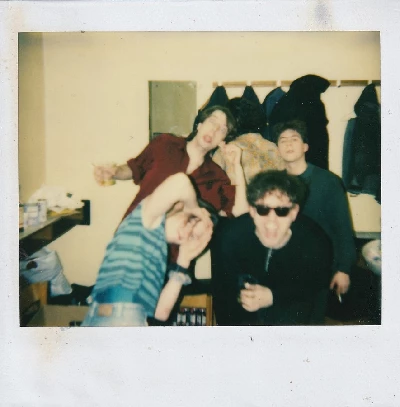
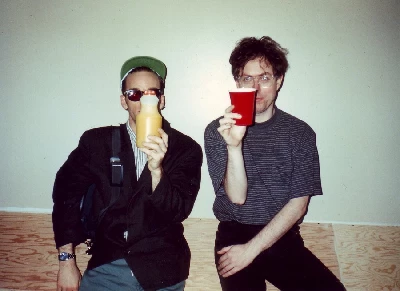
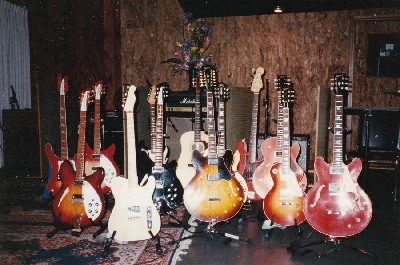
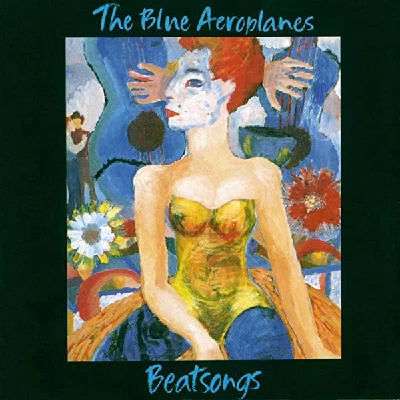
Visitor Comments:-
|
|
6272 Posted By: deebster, Birminghamistan, UK on 03 Apr 2024 |
Excellent interview, thanks.
God Beatsongs is good. Been one of my desert island discs since I first heard it.
|